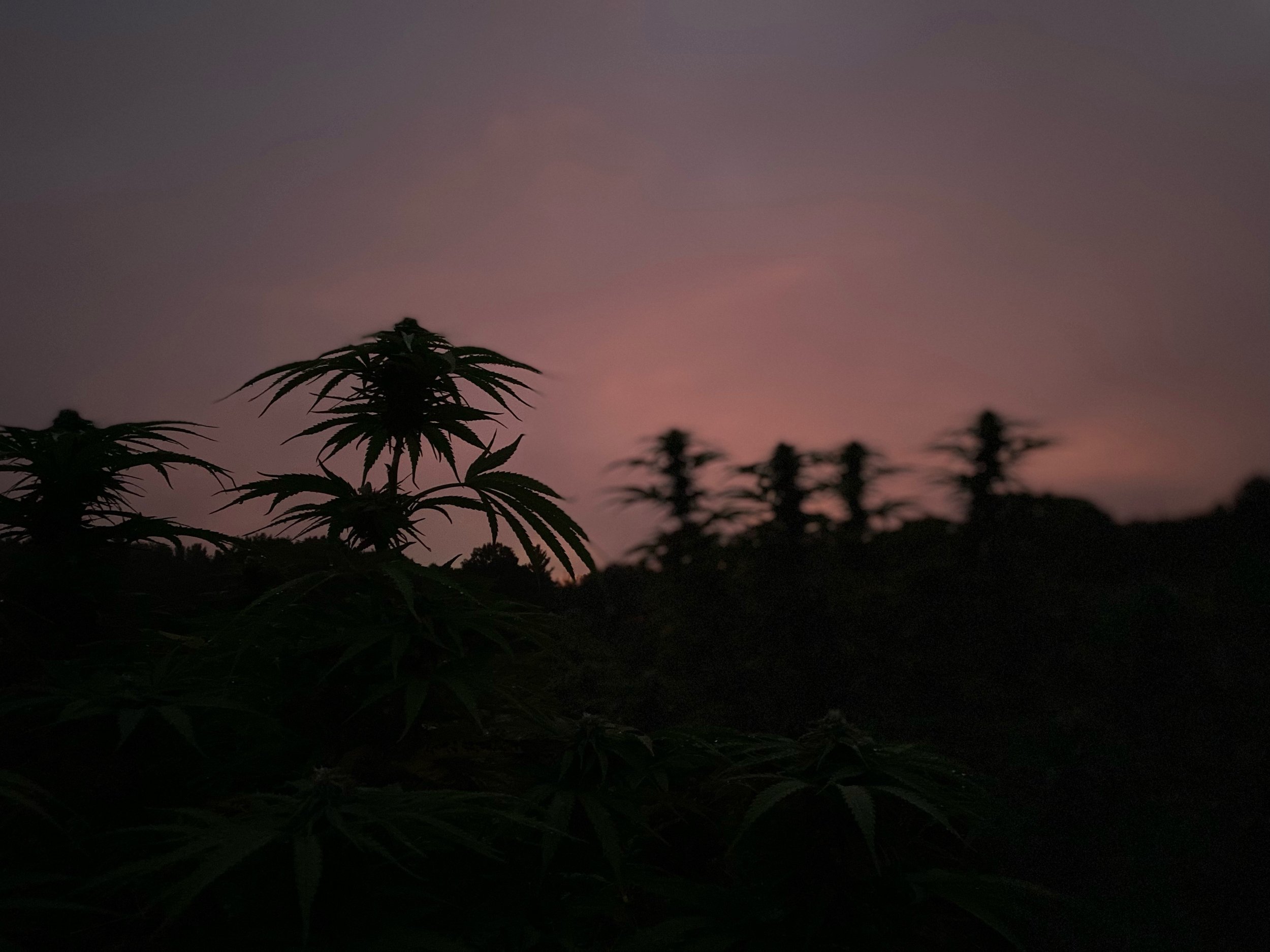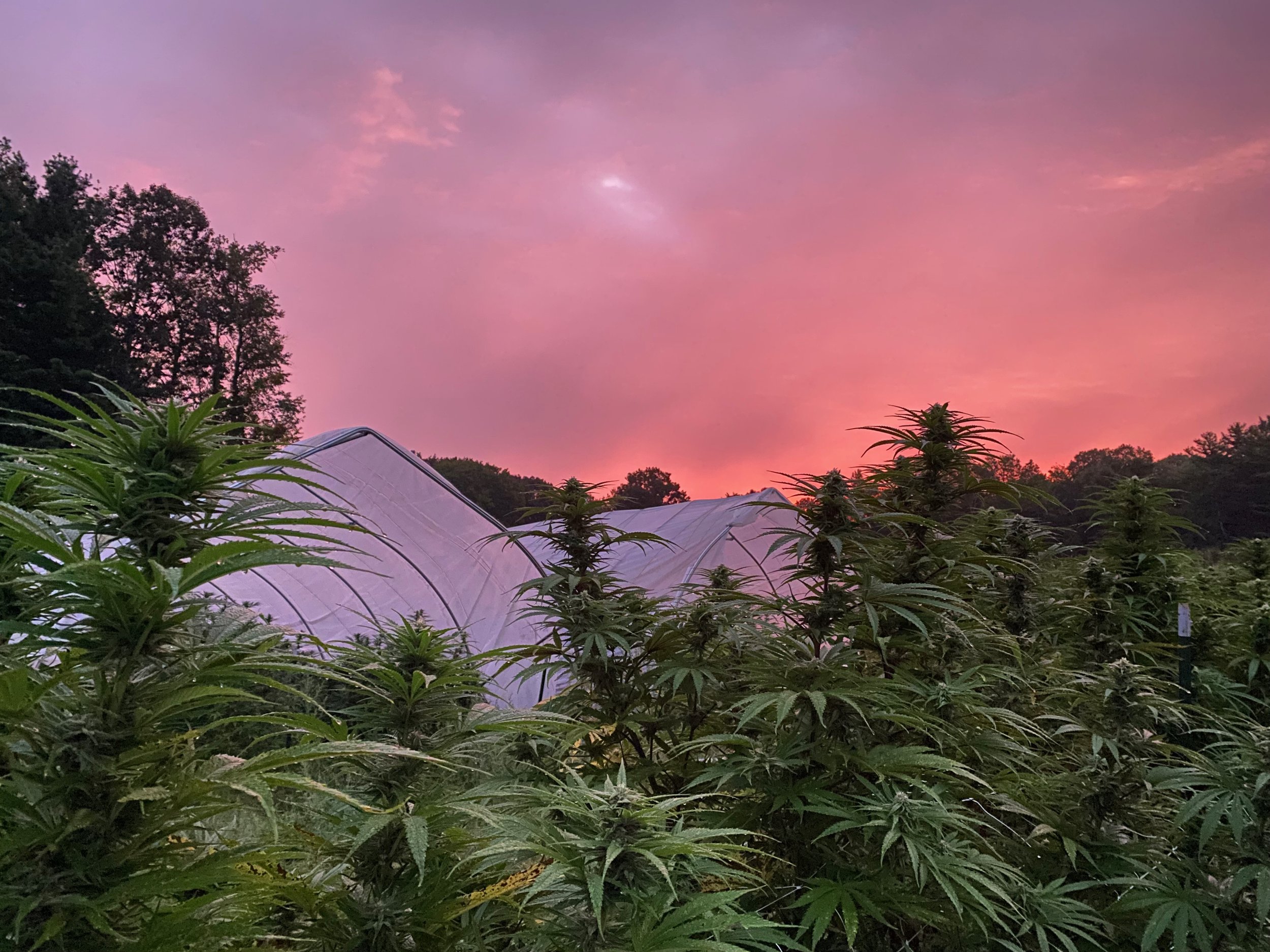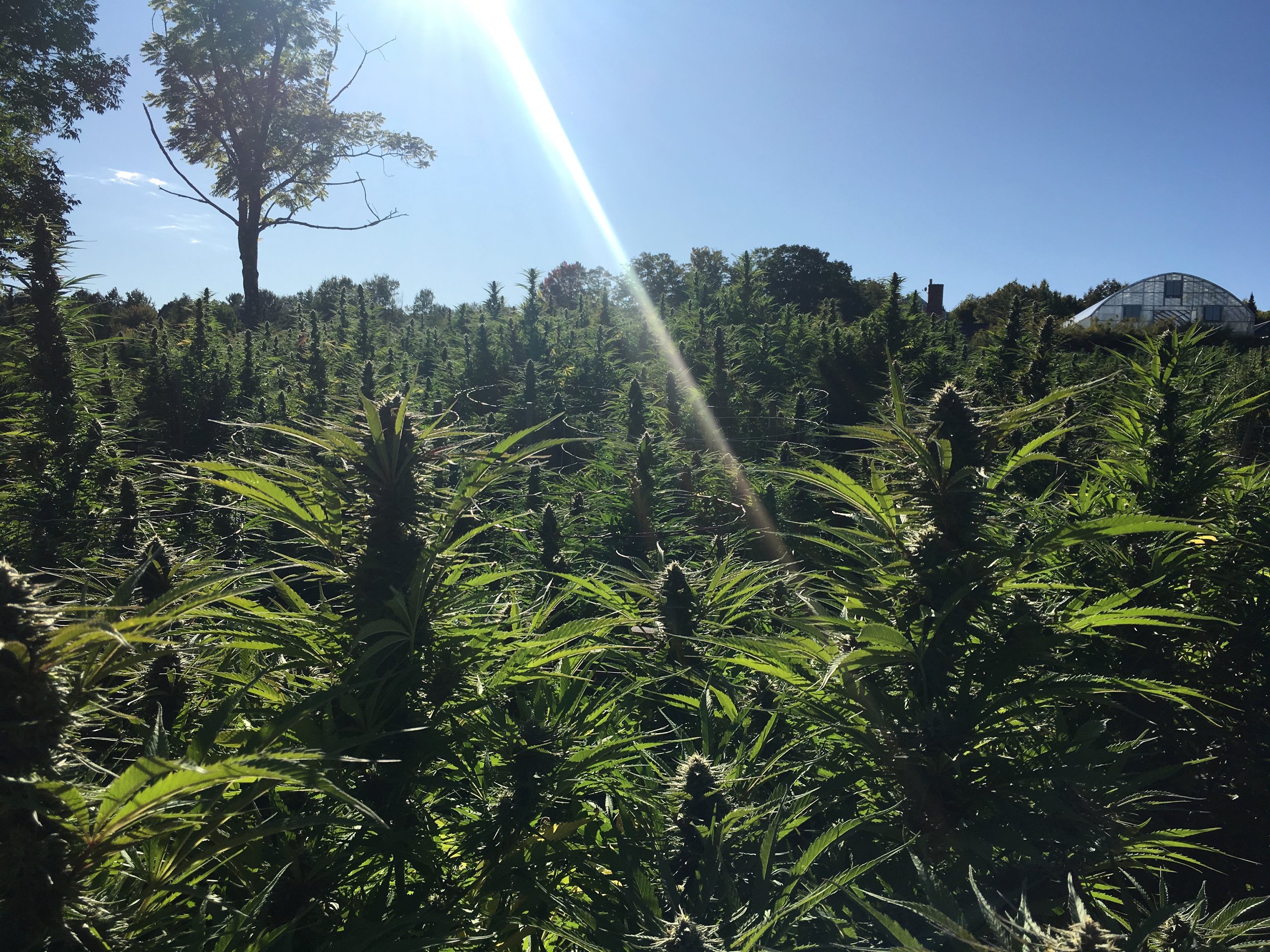EOS Farms & the Sungrown Approach to Better Cannabis
with Legacy Massachusetts farmer Ted Dobson, Ryan Montella & Jesse Sgambati from EOS Farms
In the Berkshires Mountains of Massachusetts is EOS Farms, a sun and soil cannabis brand. This organically driven, outdoor cannabis cultivation is grown by two passionate stoners who know a thing or two about the cannabis and music connection.
For the past three seasons, Ryan Montella and Jesse Sgambati have transformed the mountaintops of western Massachusetts into an incredibly biodiverse, enriching landscape exceptional for cannabis to thrive in. Their work comes from their extensive experience in agricultural knowledge and environmental stewardship.
Studying agriculture in the Pacific Northwest, Ryan Montella always found himself drawn to the psychedelic rock scene while working with national and international partnerships in agricultural development and design. When his path crossed and he met Jesse Sgambati, it didn’t take long for them to realize the strong force that was then created.
As a lifelong cannabis farmer from North California, Jesse’s dedication to the plant has put him on the front lines of legacy, medical, and recreational cannabis for two decades. Together, they watched the turn of legalization impact the masses, state by state, and saw an opportunity to make a difference where many other cannabis brands missed the mark – to grow the highest quality cannabis to market with the lowest possible environmental impact.
Cannabis on EOS Farms is grown using a low-till cultivation method, designed to build a rich soil and plant ecosystem native to the surrounding New England terroir. The essence of their cannabis is echoed in each quality genetic and flavor profile grown. Their all-natural, sungrown approach to cultivation highlights the traditional origin of cannabis like any other agricultural crop since the beginning of time – outdoors, on a farm.
When kicking off the farm’s first cultivation season, these details were a dealbreaker for Ryan and Jesse. They knew these key elements were vital to taking the quality of cannabis they’re experiencing in Massachusetts to the next level… while upholding the integrity of the land.
But as you can imagine, the rollout of policies and regulations for any newly legalized cannabis state has been pretty far from perfect.
When cannabis and hemp became legal to grow in the state of Massachusetts, a newly established policy required growers to work with the state’s new cannabis commission to regulate the cultivation and crop.
Ted Dobson, a legacy vegetable farmer and cannabis advocate in the state, quickly became the challenged wildcard in Massachusetts’ legal cannabis licensing.
When he had initially reached out to the Massachusetts Department of Agricultural Resources (MDAR) and the Cannabis Control Commission (CCC), Ted Dobson was the first farmer in the state to propose the idea of using his farmland to grow cannabis.
“Cannabis, at the federal level, is not an agricultural crop,” he reflects, “This law changed reality for everyone, and State officials, themselves, were not always clear about the guidelines.” Ted was breaking barriers in the state’s uncharted new industry. During his first phone calls to the state, he was told, “We’ve never considered a farm before!”
The CCC and MDAR rolled out a series of regulatory requirements for cannabis cultivators that pushed mechanisms for appropriate security and precise tracking. The problem is, a lot of these newly thought-out requirements were only suitably funded by large, indoor facilities – legacy farmers like Ted didn’t seem to stand a chance.
So while it was exciting for this Massachusetts legacy farmer to finally be free of the negative consequences of growing the plant, the playing field still felt unfair in terms of which growers could afford to participate. “Marijuana unfortunately has a big pay-to-play component – now that it is legal, instead of needing money to keep you out of prison, you need money to get into the game.”
Because of this, farmers are asking themselves what kind of risks they’re willing to take to get their foot in a tight door, and whether the work and funds towards it all are even worth it.
Thanks to legacy farmers like Ted, today, there is a niche to be exploited in the industry by outdoor cannabis. Cultivators like Ryan and Jesse are on a mission to promote the pure value of soil and sun.
With the mastery of building a biodiverse landscape and the support for sungrown cannabis in their favor, EOS Farms has set its reputation for cultivating the purest, quality sungrown and soil cannabis you’ll find in Massachusetts.
Focusing on the Diversity of Cannabis with Davis Seeds
& Orange Photonics
with Jeremy Klettke of Davis Seeds
and Jill Carreiro of Orange Photonics
As any expert and dedicated cannabis grower knows…the formula for quality cannabis doesn’t stop at cultivation. Growing cannabis, whether indoors or outside, requires an intricate controlled environment for optimal yield. Throw in the flurry of different plant genetics and characteristics that come from each unique cannabis cultivar – it can get complicated pretty quickly.
EOS Farms recently partnered up with worldwide seed and genetic producer, Jeremy Klettke of Davis Seeds to produce a line of plant genetics that flourish in the terroir and micro climate of EOS Farms.
Jeremey’s extensive experience in cannabis genetics stems way back to prohibition days when he was experimenting behind closed doors. He says this is what has allowed him the solitude to hone his relationship and understanding of the plant over time.
“What is most exciting to me about this relationship is how much it can impact our success with growing outdoor cannabis in New England and other similar climate types!” Jeremy comments on this partnership with EOS Farms, “We are building genetics that can produce the finest flower in the most challenging climates.”
For Davis Seeds, their breeding targets are split between producing the best genetics for user experience and giving the farmer varieties that are easy to grow. As a result, EOS Farms is growing plants with stronger resilience and vigor.
However, what’s been most appealing about this collaboration is the disinterest in high, just for the sake of it, THC content – instead, the exploration of secondary cannabinoids, like terpenes and all other compounds.
“As we start to unfold the layers of secondary metabolites the plant produces, we are beginning to look past the primary cannabinoids as breeding targets,” Jeremey states, “In some cases, this means even looking beyond terpenes to compounds such as thiols, esters, aldehydes, or flavonoids.”
It’s no secret the plant is proving to be a virtual cornucopia of compounds, something that EOS Farms and Davis Seeds aim to highlight and showcase in their connected work.
“From a business perspective, any steps we take as an industry to move towards a better understanding of all of the molecules in the plant is crucial, not just the one or two that the US Government regulates us on. This will serve a broadening of the reach of the plant, and thus a bigger market for all of us to share the plant’s valuable potential.” Jill says, “I believe this with all my heart. It’s why I do what I do; to help democratize science for everyone to learn more about the plant.”
In the race for the highest “quality” THC cannabis in the world, the nuance and beauty of craft cannabis have been washed out. This focused shift towards sungrown cannabis, which showcases the essence, quality, and therapeutic potential instead of a simple high-THC flower, presents immense opportunities for not only Ryan and Jesse, the cultivators at EOS, but also the extended team and brains of Davis Seeds and Orange Photonics.
However, with the combined work of these cannabis industry leaders – their continuous efforts are contributing to a high level of education and understanding for consumers. One that will help them better understand that quality doesn’t stem from seeking out the highest THC content to “get higher,” but fully understanding how the product they’re consuming is optimizing and influencing their endocannabinoid system. One that results in producing amazing, complex cultivars abundance in a large assortment of cannabinoids.
Together, the collaboration between Davis Seeds and EOS Farms creates cultivars that will thrive in their micro climate for a wide range of products. It also further supports their niche for sun and soil cannabis – promoting the idea that quality far outweighs THC content.
“I have always been focused on breeding for diverse compounds, and mixed-ratio plants have been part of that focus for more than two decades. The breeding trends we see on the horizon will likely be leaning away from breeding for THC potency.”
EOS Farms and Davis Seeds see this cannabis compound diversity as being the target for the best and brightest cannabis breeding in the world. Of course, they’re not alone in their actions.
Using the power of plant science for good, the team of cultivators at EOS has also partnered with Jill Carreiro – canna-mom, scientist, and engineer at Orange Photonics.
“There are over 450 molecules in cannabis, potentially all of them with therapeutic benefit, some with the potential to cure diseases that plague us, others boasting immense health and wellness benefits. It is about so much more than just the three or four molecules that we see all the time in products on the market,” Jill comments on the deeper potential of the plant, “So, I for one, am eager for the day when we have access to broader scientific research to support the unique pharmacological applications of individual cannabinoid and combined-molecule formulations.”
In the brief few years Jill has worked with Orange Photonics, she has helped advance their proprietary cannabis analyzer tool to test from 13 cannabinoids to now over 20 in any cannabis product type (including 6 psychedelic tryptamines for cannabis and mushroom fruit in-house analysis). This LightLab model is an HPLC (high performance liquid chromatogram) that lets non-technical users analyze the potency of samples at any time, any place.
The latest LightLab model by Orange Photonics offers nearly 30 pre-validated sample preparation methods, with an advanced quantification algorithm that provides LODs (lowest analyte concentrations) below parts per million.
When explaining the thought process and work behind their innovative advancements at Orange Photonics, Jill says the team embraces the Japanese attitude of “kaizen” – small, continuous, and regular improvements that embrace new changes and discoveries along the way.
After all, stoners don't want bummer, they want stoke.








